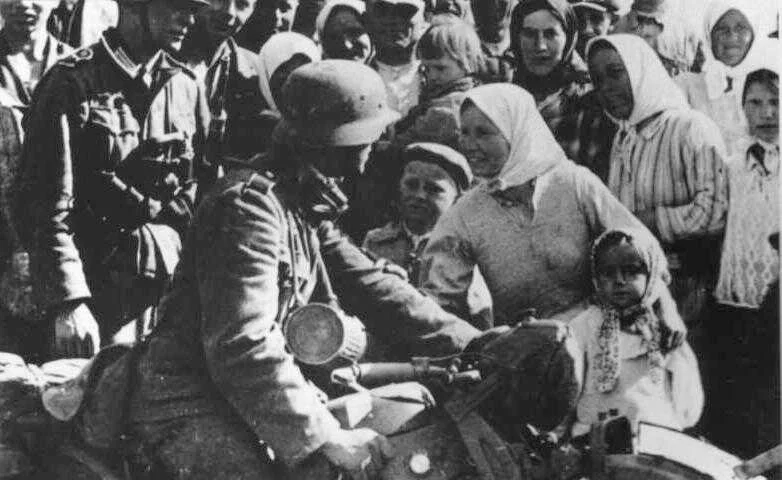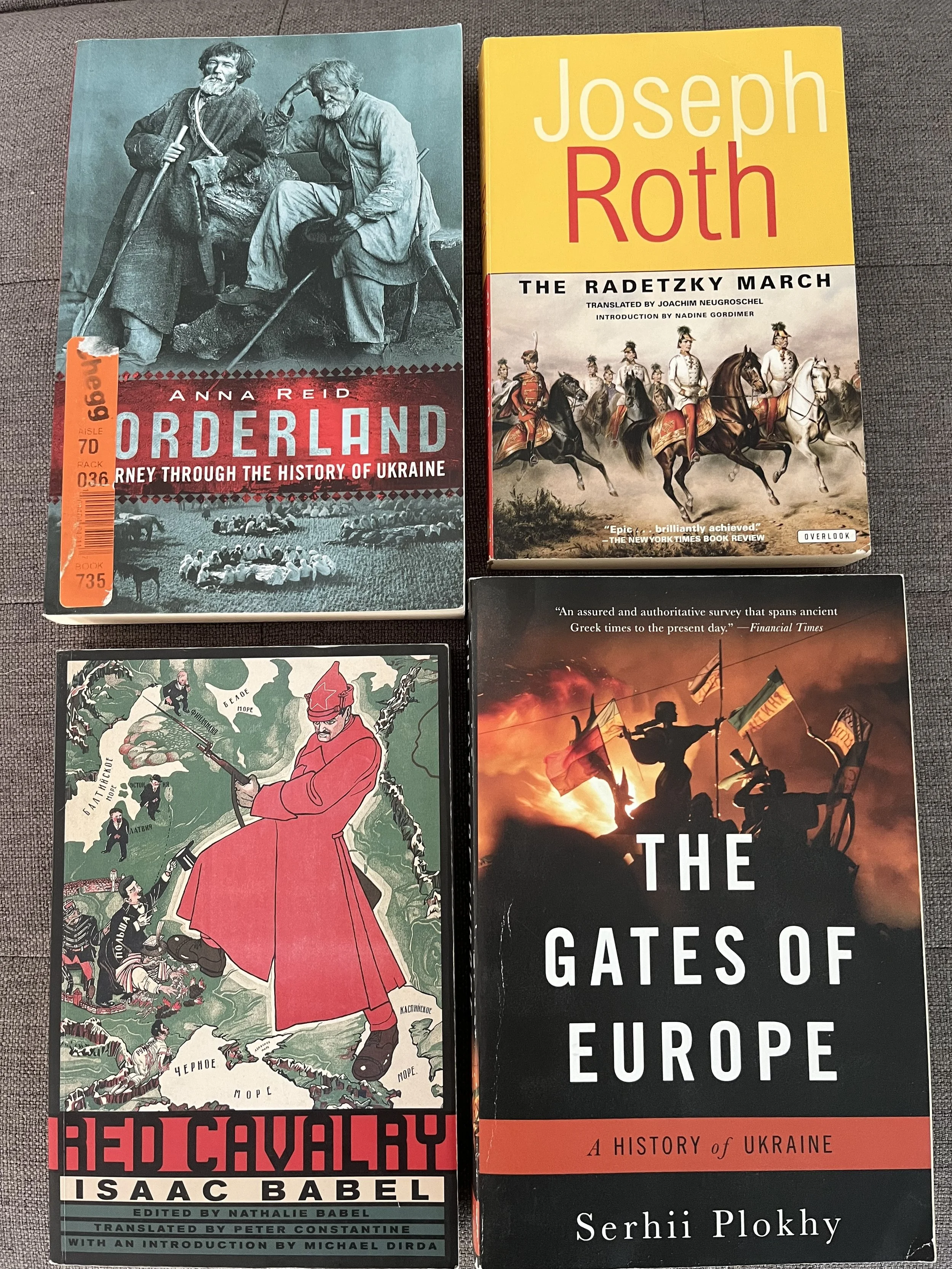Galician peasants greet Nazi troops as liberators.
9/26/24
Remembrance
For the Jews of the world, the High Holidays this October are a time for reflection, remembrance and forgiveness.
You are expected to reflect on your own behavior from the past year and ask those you've wronged for their forgiveness. You are also expected to forgive those who have wronged you.
This is also a time to recall parents, family members or other loved ones who have died. You speak their names, say sacred prayers and thus keep their memories alive. If you have family who died in the Holocaust, it's difficult to reconcile those two religious obligations. Remembrance and forgiveness. At least it is for me.
Revenge is such a powerful motivator of human behavior, and perhaps that's why the rabbis made forgiveness a vital part of the High Holiday ceremonies. Failure to let go of past slights is a recipe for chaos and discord, isn't it, rather than common purpose? Consider the current presidential campaign and the anger one man's lack of forgiveness and abundance of ego has created in our nation.
Yes, it makes intellectual sense to forgive those who have wronged you and your family. But every year at this time I also think about the lure of vengeance.
The Days Before Tomorrow grapples with this theme and explores whether vengeance liberates the soul or burdens it. The protagonists are growing up in Western Ukraine in the 1930s and avenge an anti-Semitic attack on their family with a killing that alters their lives, just as Europe descends into World War II. It's also a narrative about the way European anti-Semitism was knitted into everyday life and how it created fertile ground for the Holocaust. It wasn't just the Nazi hate machine that slaughtered the Jews of Europe. It was also the neighbors and friends of Jewish men and women in small towns across the continent who used the context of a Nazi invasion to act on age-old hatreds and ethnic biases. Decades of daily slights and indignities, forgiven and overlooked by their victims, finally led to slaughter.
The Bloody Encounter, a white paper written by Rabbi David Kehane and shared by Williams Kehane on Gesher Galicia, tells the story of six Jewish communities in pre-war Ukraine. The details it includes shaped much of my thinking about this very local form of ethnic hatred and is worth reading for anyone interested in that part of the world and what happened there during the second world war.
Warning, after reading it, you may find it more difficult to be forgiving.
8/20/24
Book Club Discussion Guide
Discuss the book's structure. Does the author use any narrative devices like flashbacks or multiple voices in telling the story? How does this affect the story and your appreciation of the book? Do you think the author did a good job with it? How do you think it might have been different if another character was telling the story?
Talk about the author's use of language/writing style. Have each member read his or her favorite passage out loud. (You might want to warn them ahead of time that they'll be doing this so they'll be prepared.) How does this particular passage relate to the story as a whole? Does it reveal anything specific about any of the characters or illuminate certain aspects of the story?
Talk about the time period in which the story is set. How well does the author convey the era? Did you have a sense of whether or not the author remained true to the events, social structures and political events of the time period?
Is this a time period that you knew a lot about before you read this book? If so, did you learn anything new? If not, did you come away with a greater understanding of what this particular time and place in history was actually like?
Is it difficult to keep our own, modern-day experiences from influencing the reading of a historical fiction tale? Can we imagine what life was really like for the characters within the context of the time period?
Compare this book to other works of historical fiction your group has read. Is it similar to any of them? Did you like it more or less than other books you've read? What do you think will be your lasting impression of the book?
Why do you suppose works of historical fiction are so popular with readers? What appeals to you the most about these types of books?
What did you like or dislike about the book that hasn't been discussed already? Were you glad you read this book? Would you recommend it to a friend? Do you want to read more work by this author?
Discuss the personalities and story arcs of the various women in the book. How do they differ from one another? How are they alike? How were they representative or different from what you would expect from women of this historical period?
Discuss the author's use of historical figures in the narrative.
How does the book differ from other fictional accounts of this period in the way it depicts the Holocaust?
How does the book reflect the current Ukrainian war with Russia?
Why do you think the author ended the book in a place like Arizona, so far from where the story began?
Thank you to the folks at Reading Group Guides for many of the above ideas.
https://www.readinggroupguides.com/historical-fiction-discussion-questions
4/19/24
The Sources of a Story
My father grew up in a place much like the village depicted in The Days Before Tomorrow. The book is not fact-based, though. It is a product of this writer's imagination and several years of research into the history, culture and norms of Galicia between the world wars.
But portions of the story are fact-inspired.
Even though my dad didn't share many stories about his youth, he did write a few of them down when he was in his 70s, a few years before his death. Some of those are retold in the novel.
His school experiences with anti-Semitism and ignorance shaped some scenes. He, like Wolchi, was left-handed and was punished harshly in his classroom for writing with that hand. He, like Wolchi, learned to be a machinist as a teenager apprenticing at a local machine shop. He, like Wolchi, survived the murder of Ukrainian Jews during World War II by working in coal mines and factories deep in the Eastern Soviet Union.
I found myself, during my research, imagining him in the historical context I was studying in books and online. What did he read as a boy? How did he relate to his siblings? His friends? I crafted much of the book with that technique, trying to see his young life in my imagined story and place
Good historical fiction, of course, is always built on a foundation of facts. And even though the events in The Days Before Tomorrow are all products of imagination, I approached the task of constructing the world in which my characters lived the way a journalist would report a lengthy and complex story.
In a previous post, I mentioned some of the good online sources of information about Galicia that I consulted during research. There were many books consulted, as well. Here are some of them. They are listed randomly, just as they are organized on my disorganized bookshelves. Most are histories and non-fiction of various types. Some, however, were novels written by others about the place and time, or novels popular at the time. Each had some impact on the book. I have underlined those that were the most impactful.
· Ukrainian Past, Ukrainian Present, edited by Bohdan Krawchenko
· Borderlands: A Journey Through the History of Ukraine, by Anna Reid
· Ukraine: A History, by Orest Subtelny
· Khrushchev: The Man and His Era, by William Taubman
· The Holocaust: A History of the Jews of Europe During the Second World War, by Martin Gilbert
· The Last Million: Europe's Displaced Persons from World War to Cold War, by David Nasaw
· Black Sea, by Neal Ascherson
· The Gates of Europe,: A History of Ukraine, by Serhii Plokhy
· Stalin: The Court of the Red Tsar, by Simon Sebag Montefiore
· The Radetsky March, by Joseph Roth
· Red Cavalry, by Isaac Babel
· Drive Your Plow Over the Bones of the Dead, by Olga Tokarczuk
· A Boy in Winter, by Rachel Seiffert
· Karol: A Man Who Became Pope, a film by Pietro Valsecchi

GALICIA: A Place that Shaped history
Most of The Days Before Tomorrow is set in what was once known as Galicia, now part of the Western Ukraine and Eastern Poland. Between World War I and World War II it was entirely within the eastern boundary of Poland. Its history of invasion, multiculturalism and shifting political control was a key back drop for the book.




